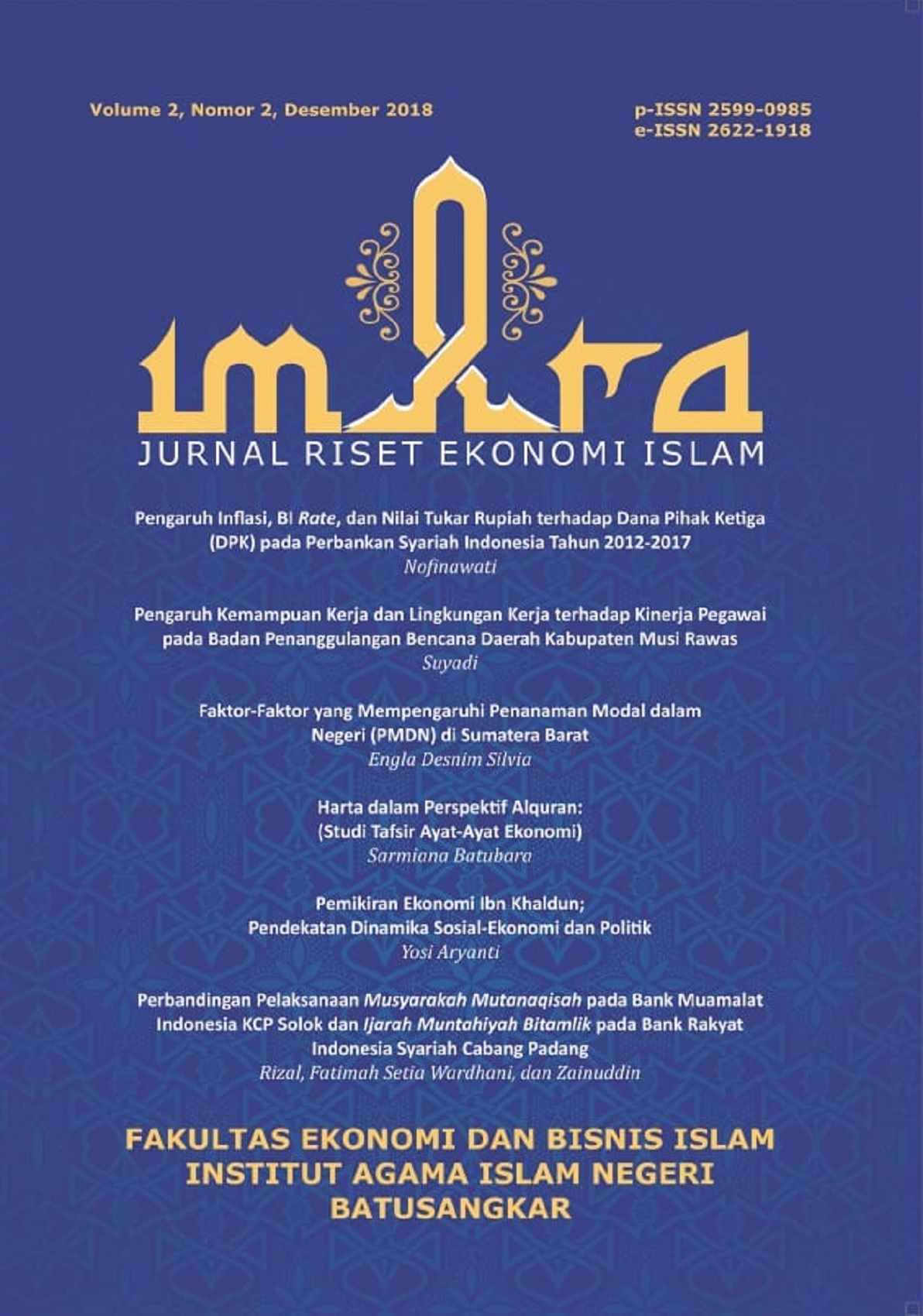ANALYSIS OF ISTISHNA' CONTRACT IMPLEMENTATION IN THE SALE OF FURNITURE PRODUCTS: A CASE STUDY IN BENGKALIS DISTRICT, RIAU PROVINCE
DOI:
https://doi.org/10.31958/imara.v7i1.8815Keywords:
IstishnaÔÇÖ, Furniture, ProductsAbstract
Background. The Istishna contract, from the point of view of mutsman (goods sold), has a special character, namely goods that are manufactured in nature, as explained in the theory of production, which, among other things, converts raw goods into finished goods. Therefore, an istishnaÔÇÖ contract of sale and purchase is impossible for natural goods, such as watermelons, durians, mangosteens, and bananas, because humans canÔÇÖt make these things. However, manufactured goods, such as vehicles (cars, aeroplanes, ships), houses, buildings, and furniture, can be used as mutsman in buying and selling istishnaÔÇÖ.
Purpose. This study aims to determine how the Istishna contractÔÇÖs implementation in buying and selling occurs at CV. Alsindo Furniture follows the perspective of Islamic Economics.
Method. This research is classified as qualitative research with an empirical descriptive approach, examining the sources used as subjects in this study. The primary data is based on observation, interviews, and documentation.
Results. The results of the research, it can be concluded that transactions occur at CV. Alsindo Mebel is following the Islamic Economics review, based on the Hanafi schoolÔÇÖs opinion, where goods being transacted are clear in shape, type, and size. In other words, buyers can enjoy goods according to their wishes..
Conclusion. The istisna contract was carried out on a CV. Alsindo Mebel follows the Islamic economics perspective. Based on the results of the research conducted, it can be concluded that the transactions that occurred at CV. Alsindo Mebel is following the Islamic Economics review, based on the Hanafi schoolÔÇÖs opinion, where the goods being transacted are goods that are clear in shape, type, and size. In other words, buyers can enjoy goods according to their wishes.
References
Alhusban, A. A. A., Massadeh, A. A. M., & Haloush, H. (2021). The Islamic credit card as an electronic payment method: the technical trick in the installment payment contract as a financial product. International Journal of Law and Management, 63(6), 599–628. https://doi.org/10.1108/IJLMA-06-2020-0158
Antonio, S., & Nugraha, H. F. (2013). Peran Intermediasi Sosial Perbankan Syariah bagi Masyarakat Miskin. Tsaqafah, 9(1), 123. https://doi.org/10.21111/tsaqafah.v9i1.43
Aristoni, A. (2018). Problematika Peran Perbankan Dalam Regulasi Kelembagaan Pengelolaan Zakat. ZISWAF : Jurnal Zakat Dan Wakaf, 5(1), 99. https://doi.org/10.21043/ziswaf.v5i1.3512
Asrowi. (2018). Ijma dan Qiyas dalam Hukum Islam. Jurnal Aksioma Al-Musaqoh, 1(1), 30–49.
Bakar, N. M. A., Yasin, N. M., Razali, S. S., & Teong, N. S. (2019). The Role of Financial Regulator in Protecting Bank Consumers from Unfair Contract Terms: The Case of Malaysian Islamic Banks. Emerging Issues in Islamic Finance Law and Practice in Malaysia, 91–115. https://doi.org/10.1108/978-1-78973-545-120191012
Chiu, J. L., Bool, N. C., & Chiu, C. L. (2017). Challenges and factors influencing initial trust and behavioral intention to use mobile banking services in the Philippines. Asia Pacific Journal of Innovation and Entrepreneurship, 11(2), 246–278. https://doi.org/10.1108/apjie-08-2017-029
Dewi, P. I. (2020). Penerapan Good Corporate Governance (GCG) Di Lembaga Perbankan Syariah. Jurnal Al-Tsarwah, 3(2), 1–15.
Estijayandono, K. D. (2019). Etika Bisnis Jual Beli Online Dalam Perspektif Islam. Jurnal Hukum Ekonomi Syariah, 3(1), 53–68. https://doi.org/10.26618/j-hes.v3i1.2125
Firdaus, M. I., Pradhana, T. A., & Nasution, S. (2020). The Concept of Money According to the Thought of Ibn Taymiyah and Imam Ghazali and its Impelemation in the Economic Field. Al-Iktisab: Journal of Islamic Economic Law, 4(2).
Hamid, A., & Dedisyah Putra. (2021). The Practice of Buying and Selling During Friday Prayer in Mandailing District Natal: A Study With A Maqashid Al-Syari’ah Approach. Samarah: Jurnal Hukum Keluarga Dan Hukum Islam, 5(2), 1021–1043. https://doi.org/10.22373/sjhk.v5i2.7575
Hasan, Z. (2021). The Effect of Profit Sharing Financing and Receivables Towards Total Assets in Islamic Banking: Case Study in BNI Syariah. LABUAN E-JOURNAL OF MUAMALAT AND SOCIETY, 15, 62–74.
Hasan, Z. (2022). The Value and Performance of Islamic. IQTISHADIA: Jurnal Ekonomi Dan Perbankan …, 15(2), 191–214.
Hasan, Z., & Azli, M. (2022). The Online Credit Buying and Selling System and its Compatibility with Islamic Law. Journal of Entrepreneurship and Business, 10(2), 17–29. https://doi.org/10.17687/jeb.v10i2.903
Khan, A. G. (2016). Electronic Commerce: A Study on Benefits and Challenges in an Emerging Economy. Type: Double Blind Peer Reviewed International Research Journal Publisher: Global Journals Inc, 16(1).
Misbach, M. N., Nafik, M., & Ryandono, H. (2019). An Overview Of Islamic Law Against Buying And Selling Sand-Land With A Liberation System (Case Study in Mount Wurung of Mojokerto Regency ). Airlangga International Journal of Islamic Economics and Finance, 1(1), 6–19.
Mohamed Saeed, S., MamunurRashid, Hassan, M. K., & Abdeljawad, I. (2021). Dependency of Islamic bank rates on conventional rates in a dual banking system: A trade-off between religious and economic fundamentals. International Review of Economics & Finance.
Muryanto, Y. T., Kharisma, D. B., & Ciptorukmi Nugraheni, A. S. (2022). Prospects and challenges of Islamic fintech in Indonesia: a legal viewpoint. International Journal of Law and Management, 64(2), 239–252. https://doi.org/10.1108/IJLMA-07-2021-0162
Novita, D., El-Falahi, L., & Haris Maiza Putra. (2022). Khiyar in Buying and Selling Online Based on the Fiqh Perspective. Al-Istinbath: Jurnal Hukum Islam, 7(2), 363–380.
Rudiansyah, R. (2020). Telaah Gharar, Riba, dan Maisir dalam Perspektif Transaksi Ekonomi Islam. Al-Huquq: Journal of Indonesian Islamic Economic Law, 2(1), 98. https://doi.org/10.19105/alhuquq.v2i1.2818
saqib, L., Zafar, M. A., Khan, K., Roberts, K. W., & Zafar, A. M. (2015). Local agricultural financing and Islamic banks: is Qard-al-Hassan a possible solution? Journal of Islamic Accounting and Business Research, 6(1), 122–147. https://doi.org/10.1108/JIABR-04-2012-0018
Schoon Natalie. (2016). Modern Islamic Banking, Products and Processes in Practice. In www.wiley.com. (Ed.), ثبثبثب: Vol. ث ققثق (First, Issue ثق ثقثقثق). 2016 John Wiley & Sons Ltd.
Selim, M. (2020). The effects of eliminating Riba in foreign currency transactions by introducing global FinTech network. International Journal of Islamic and Middle Eastern Finance and Management, 14(3), 506–523. https://doi.org/10.1108/IMEFM-01-2020-0035
Shafira, Z., Khasanah, U., & Farida, Y. (2021). Analisis Performa Mata Uang Virtual (Cryptocurrency) Menggunakan Preference Ranking Organization Method for Enrichment Evaluation (Promethee). REKAYASA Journal of Science and Technology, 14(1), 1–9.
Sholikhin, M. Y., Nurul, R., & Amijaya, F. (2019). E-Commerce Based on the Law of Buying and Selling in Islam. The 2nd International Conference on Islamic Economics, Business, and Philanthropy (ICIEBP, 2019, 1360–1370. https://doi.org/10.18502/kss.v3i13.4290
Soemitra, A., Irawan, D., & Fitrah, R. (2021). Electronic Money in Islamic View: Literature Study. International Journal of Engineering Technology Research & Management, 05(08), 58–67.
Sumarliah, E., Khan, S. Z., & Khan, R. U. (2022). Modest wear e-commerce: examining online purchase intent in Indonesia. Research Journal of Textile and Apparel, 26(1), 90–108. https://doi.org/10.1108/RJTA-11-2020-0121
Suzuki, Y. (2013). A Post-Keynesian perspective on Islamic prohibition of Gharar. In International Journal of Islamic and Middle Eastern Finance and Management (Vol. 6, Issue 3, pp. 200–210). https://doi.org/10.1108/IMEFM-Sep-2012-0086
Wady, M. R., & Kurniawan, R. R. (2018). Fiqh Muamalah Overview of Electronic Money Products at Linkaja Shariah. Jurnal Ekonomi Dan Perbankan Syariah, 6(1), 90–106.
Widyastuti, M., & Hermanto, Y. B. (2021). Cryptocurrency Analysis of Indonesian Market Education Facilities. International Journal of Economics, Bussiness and Accounting Research (IJEBAR), 2021(2), 534–546.
Zulfikar, A. A., & Sasnifa, P. (2020). Transaction in non-cash payments through Ovo application: an Islamic judgment study by the Mazhab Syafi’i. Ulul Albab: Jurnal Studi Dan Penelitian Hukum Islam, 3(2), 219. https://doi.org/10.30659/jua.v3i2.8038
Downloads
Published
How to Cite
Issue
Section
License
Copyright (c) 2023 Sri Wahyuningsih, Zulfikar Hasan, Puji Afriyeni

This work is licensed under a Creative Commons Attribution-NonCommercial 4.0 International License.
Authors who publish with this journal agree to the following terms:
- Authors retain copyright and grant the journal the right of first publication with the work simultaneously licensed under?áa Creative Commons Attribution-NonCommercial 4.0 International License?áthat allows others to share the work with an acknowledgment of the work's authorship and initial publication in this journal.
- Authors are able to enter into separate, additional contractual arrangements for the non-exclusive distribution of the journal's published version of the work (e.g., post it to an institutional repository or publish it in a book), with an acknowledgment of its initial publication in this journal.
- Authors are permitted and encouraged to post their work online (e.g., in institutional repositories or on their website) prior to and during the submission process, as it can lead to productive exchanges, as well as earlier and greater citation of published work.









